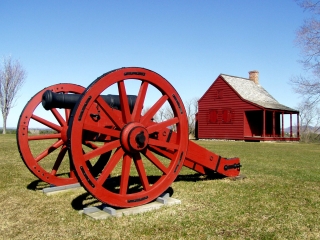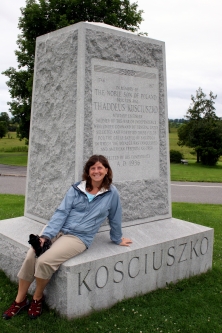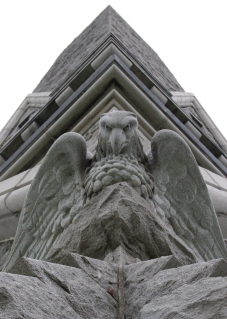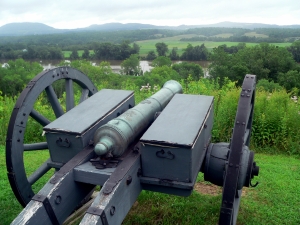Saratoga National Historical Park
Stillwater, N.Y.
Visited: March 29, 2004
Second Visit: July 23, 2006
NPS Site Visited: 10 of 353
NPS Website; Local Website
 WHAT IS IT? WHAT IS IT?
Site of two pivotal 1777 Revolutionary War battles.
BEAUTY (5/10)
Hills mixed with forested terrain and open fields characterize the main portion of Saratoga NHP, the approximately 3000-acre battlefield site. A 10-mile self-guided auto tour route scurries the visitor around the countryside to the time-honored places of interest with able battlefield park aplomb. Helpful red and blue stakes throughout the Site remind the visitor of the battle lines held by the British and American soldiers respectively in 1777.
Once you leave the pavement and set off on foot, the landscape’s historical power sinks in. The up-and-down hike from Chatfield Farm to the Balcarres Redoubt delves into the forest, crosses a mild ravine and eventually delivers you to the Barber Wheatfield, and open field where hours of fierce fighting occurred.
The path is the same trail that the American soldiers took over 225 years ago. When you edge out of the forest and see the cannons pointed toward you and the British fortification stakes it is not hard to be transported back in time.
The Schuyler House and the Saratoga Monument sit eight miles northeast of the Saratoga Battlefield grounds and share the small New York town ambiance of their host, Schuylersville. The Schuyler House, country home of General and patroon Philip Schuyler, is a typical two-story yellow Colonial Georgian design, fully restored and ready to tour. The 155-foot tall Saratoga Monument is a surprisingly ornate obelisk that offers spectacular views of the not so spectacular scenery.
 HISTORIC SIGNIFICANCE (9/10) HISTORIC SIGNIFICANCE (9/10)
The National Parks Guidebook ranks the Battle at Saratoga as one of the 15 most decisive battles in World History. It was our nation’s first significant victory of the Revolution. A Park Brochure states that in 1999 the New York Times Magazine called it the “most crucial battle of the 1000 years.” We are not going to succumb to that kind of hyperbole.
Nevertheless, had we not won, the Britons would have effectively cut New England from the remainder of the breakaway nation, dooming our chances for success. From the victory came French support and perhaps most importantly an impetus to France to rekindle war efforts in Europe against England. No Saratoga victory, no United States.
CROWDS (8/10)
During our first visit, in March of 2004, we saw very few people, just locals walking their dogs and joggers enjoying their isolated park. In March, the auto tour road had not even opened for travel. You can use your car only from April through November.
In August, however, the Saratoga area becomes a tourist mecca with the beginning of Saratoga Spring’s racing season and jam-packed waters of nearby Lake George. Given the season, the Site’s crowds were still not as large as expected. We had the hikes and the auto tour road largely to ourselves.
EASE OF USE/ACCESS (3/5)
Schuylerville, N.Y. is ten miles east of Saratoga Springs and I-87, Exit 14 via the winding New York Route 29. The Battlefield is a further eight miles south on U.S. Route 4. Once the auto tour road is opened, the Battlefield is very accessible. But during any time of the year you owe it to yourself to get out of the auto tour rut and walk. Short paved trails to and through the Redoubts make your excursion easy.
 CONCESSIONS/BOOKSTORE (3/5) CONCESSIONS/BOOKSTORE (3/5)
As would be imagined, the Store stocks a good selection of Revolutionary War texts. We bought a nice postcard of Thaddeus Kosciuszko, the handsomest man of the War and designer of the Saratoga Battlefield’s redoubt defense system.
We are pretty sure no other National Park Site vends bottled Saratoga spring water outside its Visitor Center.
COSTS (3/5)
Entry is $5 per car into the Battlefield portion of the Park. Admission is free with the National Parks Pass and free from November through March (when the roads are closed).
The Schuylerville sites are both free. You can climb Saratoga Monument and tour the Schuyler House without spending one penny. What a bargain!
RANGER/GUIDE TO TOURIST RATIO (4/5)
There are very helpful Rangers at the Battlefield Visitor Center. Once you get out on the auto tour, however, you are on your own.
It is a different story in Schuylerville where stellar, knowledgeable Rangers spew Revolutionary info at both its attractions.
TOURS/CLASSES (7/10)
The Saratoga NHP Visitor Center Museum has seen a flurry of recent additions. In 2002, a new film debuted while in 2005 the Museum welcomed a gargantuan fiber-optic map and new exhibit panels. We were not overly impressed by any of the improvements, especially the 15-minute+ electric map program, which would have been perfect with a good deal of editing.
 The Site’s educational forte is its Rangers. Their talks and understandings are indispensable. Our Ranger-led tour of the Schuyler House was one of the most skilled, subtle and perfect historical teaching talks of our entire trip. A different Ranger, posted at the Saratoga Monument, talked our socks off about Benedict Arnold, the Monument’s quirks, answered dozens of our questions and enchanted us with his vibrant personality. The Site’s educational forte is its Rangers. Their talks and understandings are indispensable. Our Ranger-led tour of the Schuyler House was one of the most skilled, subtle and perfect historical teaching talks of our entire trip. A different Ranger, posted at the Saratoga Monument, talked our socks off about Benedict Arnold, the Monument’s quirks, answered dozens of our questions and enchanted us with his vibrant personality.
FUN (8/10)
When we came through Saratoga NHP the first time, we thought a 5-mile hike through the battlefield was sufficient. We were wrong. While we may have gotten the gist of the battles, we missed out on a great house tour and an equally impressive monument, each with their own stories. We made the right choice stopping in Schuylerville this time around.
We toured the Schuylerville sites with wonderful fellow central Pennsylvania tourists and a set of friendly New York history buffs and golfing enthusiasts. Our conversations and laughter with our traveling cohorts were the highlights of our return visit and made us thankful that we had given this Site another chance.
WOULD WE RECOMMEND? (8/10)
Yes. It is such an important part of American history. If you are in the delightful and historic town Saratoga Springs for the races in August, definitely come. If not, Saratoga NHP deserves far more pilgrimages than it receives. At least as many people as the throngs that flock to Gettysburg.
TOTAL 58/80
|